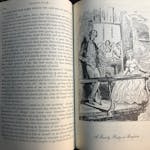As I write this, grief lies heavy on the literary community while word makes its way around that our beloved poet, teacher and friend Robert Bly has passed from this life. There's no gauging the depth of gratitude we owe to Robert for the great gifts with which he was so generous during his long career as poet, provocateur and mentor. Properly honoring him will be a task for each of us to take up in our own way for the foreseeable future.
I am far from alone or unique in my debt to Robert. His literary and spiritual children are legion. For myself, I have learned from him for more than 50 years, from both his strengths and his weaknesses, from the time I first heard him recite his fiery antiwar poem "The Teeth-Mother Naked at Last" at Coffman Memorial Union in 1969.
I was one of a van-load of students driven to the reading by our then-English professor James Lenfestey. That Jim and I would actually become poet-friends of this towering, charismatic, prophetic figure I know at the time would have blown our minds. Through some inexplicable quirk of luck, I also became his personal assistant for his last 30 years.
In COVID times I'd visited Robert and his wife, Ruth, every month or so. Thanks to Ruth's faithful caregiving, Robert plainly enjoyed his life, circumscribed as it had become, until very close to the end.
As of two or three months ago, he still asked for his morning coffee, took pleasure in visitors coming to sing or read poetry for him, and radiated some original joy in being alive, that spark still lit in his striking blue eyes.
Ten days before Robert's death I sat beside the hospital bed set up for him in the Blys' dining room and mostly tried to be with him quietly. He couldn't say much by then, but even so was subtly responsive.
He moved almost imperceptibly between sleep and waking. I asked him if he was having many dreams, and he answered clearly, "Not so much." I can only imagine that his consciousness at that point lay somewhere beyond what we dichotomize as waking/dreaming.
I couldn't help thinking of his poems about his father's death published over 25 years ago in his collection "Meditations on the Insatiable Soul." Certain lines came back to me: "What can I do but feel time go through me, and sit here with you?" And more eerily the one about sitting with his father at the funeral home: "A voice says to me: 'For now you are the standing one.' "
I didn't want to say goodbye to this man who I loved so much, who so many have loved, and who had given us so much, so I didn't, though I knew very well that death was gathering itself around him.
And now it has come to pass — not a shock, and yet — a shock. There will be much to remember, much to say, much to celebrate about Robert in the time to come. Friends, let's all join hearts in doing the work, and honor the many ways he has touched and enriched our lives.
Thomas R. Smith is a poet in Wisconsin. TRSmithpoet@gmail.com




